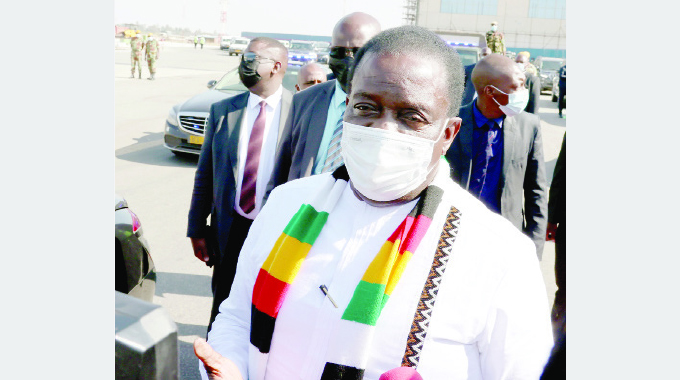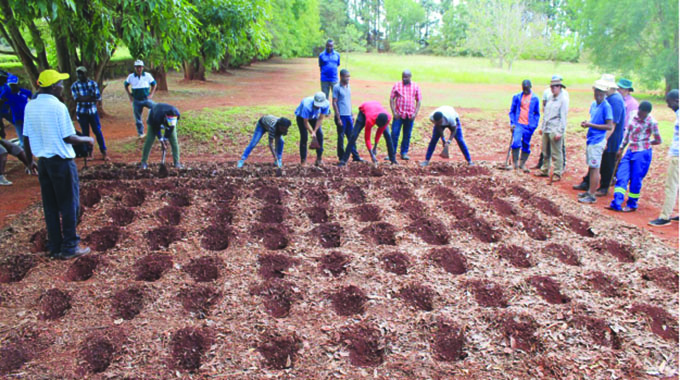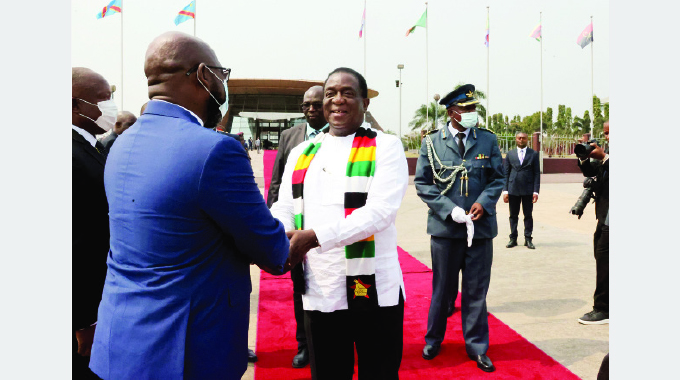Industrialisation key to food security — President

Political Editor
ENSURING that member states of the Southern African Development Community (Sadc) become food secure through industrialisation, agro-processing, and harnessing technology is key to regional development and elimination of dependency on foreign countries, President Mnangagwa has said.
Speaking to journalists at Robert Mugabe International Airport in Harare yesterday soon after arriving from the Democratic Republic of Congo where he attended the 42nd Sadc summit that was held under the theme, “Promoting industrialisation through, agro-processing, mineral beneficitation, and regional value chains for inclusive and resilient economic growth”, President Mnangagwa said the region was in agreement that it has all the requisite resources for self-sustenance.
During the summit, he said, Sadc interrogated how member states are moving in line with the policy of industrialisation.
“It’s a strategy which we were now interrogating how each member state is moving on the issue of industrialisation of the region and we felt that there are two key areas of industrialisation, the priority one was the issue of food security, that we must use our agriculture and make sure that the region is food secure.
“The impact of the Russia/Ukraine conflict has made it imperative that as a region we should address the issue of food security in our region and that in fact most of our member states have the requisite agricultural means to focus on production of agriculture but not only on that, we also said we must address science and technology in terms of agro-processing, value addition to our products.”
President Mnangagwa said the summit also zeroed in on mining with emphasis on beneficiation as the region is well endowed with mineral resources that are however, being exported raw.
“We said the time has come for Africa and our region to address the question of exporting raw materials, we must deal with that issue.”
Both policies are in sync with the Second Republic’s industrialisation and modernisation agenda that is anchored on the National Development Strategy 1 (NDS1), the framework towards Vision 2030 to become an upper-middle class economy.
Earlier, during a session on regional food and nutrition security outlook 2022/23 at the summit, President Mnangagwa explained interventions that his Government has put in place to lift its citizens from hunger and industrialise even rural areas.
He said chronic challenges associated with food and nutrition security need decisive, holistic and forward-looking action to achieve the region’s vision of ending poverty and improving the quality of life for its citizens.
The President said Zimbabwe is strengthening its internal capacities and building resilience to deal with the threat of food and nutrition insecurity.
“Regrettably, in our case, the situation is exacerbated by some rogue non-governmental organisations that use humanitarian and food aid as a smokescreen for perpetuating their nefarious, destabilising agendas within our country.
“The increased frequency of climate-related disasters and the prevailing supply chain disruptions has seen my Government scale up programmes towards building resilience in the agriculture sector and agro-value chain industries.
“The adoption of a Climate a Proofed Agriculture model, dam construction programmes and ongoing drilling of boreholes in every village with nutrition gardens for both subsistence and commercial benefit, have all had positive impacts. Furthermore, my country is scaling up the establishment of rural industrialisation.
“This is increasing our rural incomes and providing empowerment and employment opportunities for our people right where they live, especially the youth and women. Hence, determinable numbers within our communities are being lifted out of poverty, into prosperity,” said President Mnangagwa.
He was welcomed at the Robert Mugabe International Airport by Defence and War Veterans Minister Oppah Muchinguri-Kashiri, Home Affairs and Cultural Heritage Minister Kazembe Kazembe, Chief Secretary to the President and Cabinet Dr Misheck Sibanda, service chiefs and senior Government officials.











Comments